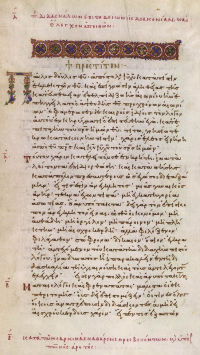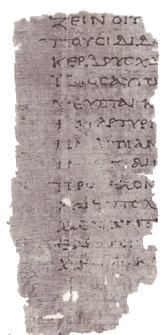[How Are Bible Translations Different?]
Titus, out of Apostle Paul's fourteen books, is the second smallest in terms of chapters (3), verses (46), and total words (915) in the King James Bible. In regard to the entire KJV, it has the sixth smallest number of verses.
Date Written
The Apostle Paul wrote Titus in 63 A.D., the same year he wrote 1Timothy. He wrote it from Nicopolis, a city in the western part of Macedonia (see subscription of Titus 3:15 found in the King James and other Bibles).
[Where Did the First Christians Live?]
The Author
Titus was a gentile who likely, at the time he became a Christian, lived in Syrian Antioch. The Apostle Paul's designation of him as "mine own son . . ." (Titus 1:4) suggests Paul was instrumental in his conversion.
Titus likely spent most of time, in and after 63 A.D., overseeing the churches on the island of Crete. One tradition states Titus died on the island and was buried in Gortyna.
Titus Chapter Outline
Chpt. 1: Paul's greeting in Titus reiterates an encouraging promise God has made to those who are called and converted.
In hope of eternal life, which God, that cannot lie, promised before the world began (Titus 1:2).

Paul then immediately gets to the point of his letter by reminding Titus he was left on Crete in order to organize the many scattered Christians on the island (verse 5).
[How to Start and Operate a Church!]
The organization of Crete's believers will require finding overseers who are not hard headed, or quicky angered, or given to drinking much wine, or who greedily pursue material possessions. They should, instead, be a good husband and father, hospitable, sound minded, and able to control their impulses and desires (Titus 1:6 - 8).
Those who are set apart as overseers should also be able to effectively defend Jesus' teachings against the many false teachers that exist. These deceivers promote beliefs such as the necessity of circumcision for salvation. They also lead people away from the truth by promoting Jewish myths and man-made rules that circumvent and override God's righteous laws (Titus 1:9 - 11, 14).
Those who are quietly attempting to lead Christians astray, though proclaiming belief in God, can be known by their complete lack of good works (Titus 1:16).
[Location of New Testament Churches!]
Chpt. 2: Paul, after reminding Titus to focus his teachings on sound doctrine, lists the behavior that should and should not be encouraged in various groups of Christians.
Older Christian men should be sound and serious minded, loving and patient. Older women ought not to spread slander or indulge in much wine, but rather be teachers of what is right. Part of their responsibility is to teach younger women to be sound minded as well as good wives and mothers (Titus 2:2 - 5).
[The Basic Teachings of Scripture!]
Interestingly, Paul's only admonition to young men is that they be sound minded (Titus 2:6).

The epistle returns to discussing Titus by exhorting him to be an example of good works and to base his teachings on sound Biblical principles. According to the apostle, a good understanding of Scripture is the basis of opposing those who seek to subvert the truth (Titus 2:7 - 8).
Christian slaves should be taught to not steal from their masters or talk back to them. They should, rather, show themselves to be trustworthy servants so that their example might promote true Christianity to others (Titus 2:9 - 10).
Paul begins to close the chapter be revealing God wants Christians to become his "peculiar people" just like he wanted for the ancient Israelites (Titus 2:14, see Exodus 19:4 - 5). He ends with admonishing his friend to rebuke those who teach false doctrine and not to let people on Crete despise him.
Chpt. 3: In this chapter Paul stresses the need for good works in verses 1, 8 and 14.
Titus is told to remind the sometimes rebellious and hard headed Cretans (see 1:12 - 13) to submit themselves to their governing authorities. They should, instead, pursue good works. Paul also wants the Cretans to be taught to be gentle and humble (Titus 3:1 - 2).
Titus is additionally warned to avoid foolish and useless debates about Jewish genealogies and God's law since they are ultimately unprofitable. Paul recommends that after two admonitions to stop spreading heretical teachings that heretics should then be avoided entirely.
[What Did Paul Teach about God's Law?]
Paul closes his letter by requesting Titus visit him in Nicopolis of Macedonia after one of two men, sent by the apostle, arrives on Crete.
When I shall send Artemas unto thee, or Tychicus, be diligent to come unto me to Nicopolis: for I have determined there to winter (Titus 3:12).